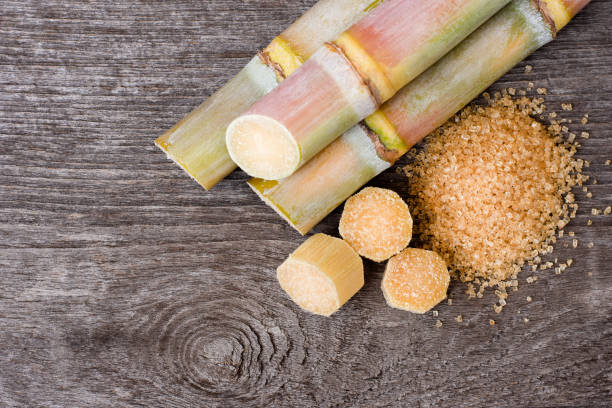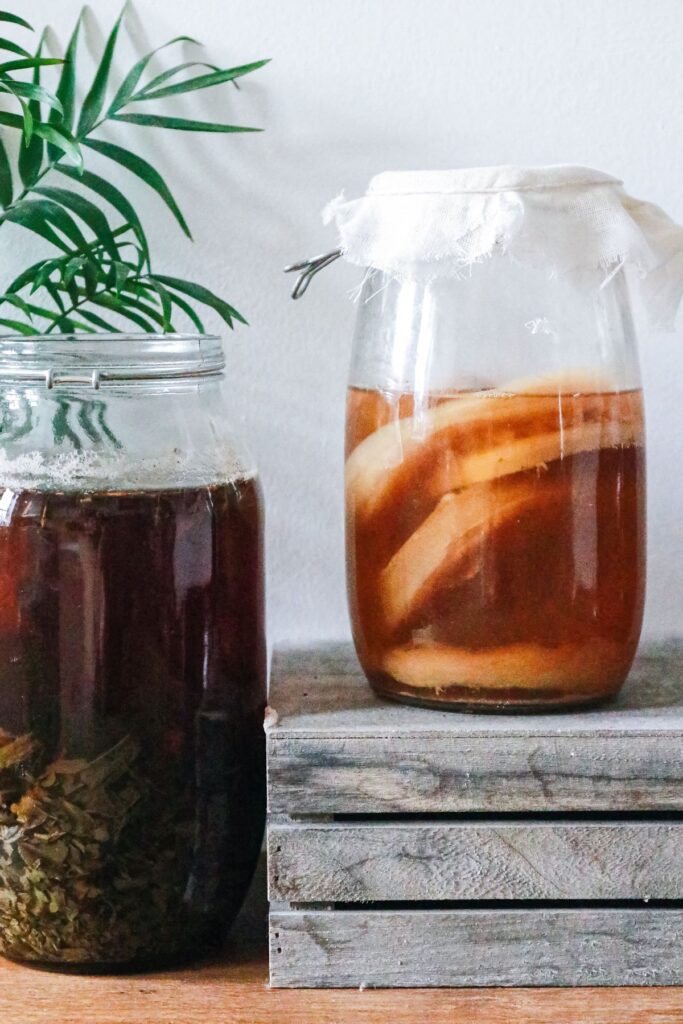What to Eat and Drink
Best Sugar for Kombucha
Are you a kombucha fan looking for the best sugar to use in your homebrew? There is no need to look any further! In this article, we will look at the best sugars for kombucha to ensure the proper mix of sweetness and fermentation.
Not all sugars are created equal when it comes to kombucha. The goal is to select a sugar that will sustain the SCOBY (symbiotic culture of bacteria and yeast) while avoiding artificial additions or processed sweeteners.
What is kombucha?
Kombucha is a fermented tea beverage that has recently acquired popularity due to its multiple health advantages. It is prepared by fermenting sweetened tea with the help of a SCOBY, which is a beneficial bacterium and yeast culture. The sugar in the tea is converted throughout the fermentation process into organic acids, probiotics, and other substances that give kombucha its distinct flavor and health-promoting characteristics.

The importance of sugar in kombucha fermentation
Sugar is essential in the fermentation process of kombucha. It feeds the SCOBY by giving the energy required for the bacteria and yeast to flourish and produce the desirable byproducts. The SCOBY consumes the sugar during fermentation and turns it into organic acids such as acetic acid and gluconic acid, which give kombucha its acidic flavor. The sugar also helps to carbonate the liquid, resulting in those wonderful bubbles.
Different types of sugar used in kombucha brewing
There are several varieties of sugar that can be used in kombucha brewing, each with unique properties. Sugars that are regularly utilized include cane sugar, white sugar, honey, and fruit sugars. Let’s look at each of these alternatives in more detail.
Cane sugar
Because of its relatively neutral flavor and large sugar concentration, cane sugar is a popular choice for brewing kombucha. It gives the SCOBY the nutrients it needs without adding any undesirable flavors or chemicals. Cane sugar is available in both granulated and liquid forms, making it simple to include in your brewing process.
White sugar
White sugar, commonly known as refined sugar, is another popular ingredient in kombucha. It is extensively treated to remove impurities and has a homogeneous texture that allows it to dissolve easily in tea. While white sugar adds no flavor to the beverage, some individuals choose less refined alternatives for health or ethical reasons.

Honey
Honey is a natural sweetener that gives kombucha a distinct flavor profile. It contains enzymes, antioxidants, and antibacterial qualities that can improve the beverage’s overall health advantages. However, honey may impede the growth of certain bacteria and yeast strains in the SCOBY, thus it is best to use it in conjunction with other carbohydrates for a good fermentation.
Fruit sugars
Fruit sugars can be used to sweeten and flavor kombucha, such as dried fruits or fruit juices. They add a delicate fruity flavor and can be a fun way to try out new flavors. However, it is critical to examine the sugar content of the fruits and adapt the recipe accordingly to avoid overfeeding the SCOBY and producing fermentation process imbalances.
The role of sugar in kombucha flavor and carbonation
Sugar is an important factor in determining the flavor and carbonation level of kombucha. The amount and type of sugar used have a direct impact on the fermentation process as well as the final flavor of the beverage. More sugar produces a sweeter kombucha, while less sugar produces a tangier flavor. Because carbon dioxide is created during fermentation, the carbonation level can also be changed by altering the sugar amount.

Pros and cons of using different types of sugar in kombucha brewing
Each variety of sugar used in kombucha brewing has its own set of benefits and drawbacks. Let’s look at the benefits and drawbacks of various sugars to help you make an informed decision.
Cane sugar
Pros: – Neutral flavor that does not overshadow the taste of kombucha – High sugar content gives plenty of nourishment for the SCOBY – Affordably priced
Cons: Some folks prefer less sophisticated alternatives. – It can be difficult to find organic or fair-trade versions.
White sugar
Pros: – Highly refined and readily dissolved in tea – Adds no additional tastes to the brew – Widely accessible and inexpensive
Cons: – Low nutritional value as a result of intensive processing – Ethical and health concerns related with refined sugar consumption
Honey
Advantages: – Adds a distinct flavor and potential health advantages – Antimicrobial sweetener made from natural ingredients – Adds more enzymes and antioxidants.
Cons: – Can limit the growth of some bacteria and yeast strains – Can change the fermentation process if used as the sole sugar source
Fruit sugars
Pros: – Adds natural fruit flavors and scent to kombucha – Increases nutritional value from fruits – Allows for flavor flexibility and experimenting
Cons: – Fruit sugar concentration varies, necessitating recipe modifications – Excessive fruit sugars might cause fermentation imbalances
How to choose the best sugar for your kombucha
The ideal sugar for kombucha is determined by your particular preferences, dietary limitations, and preferred flavor profile. Here are some things to think about when making your decision:
- Flavor: Choose if you want a neutral flavor or to experiment with different flavors such as honey or fruit sweets.
- Nutritional value: Think about the nutritional value of the sugar you chose. Honey, for example, has enzymes and antioxidants that can help kombucha’s health advantages.
- Fermentation process: Some sugars, such as honey, may require brewing process changes to ensure proper fermentation. Take into account the sugar’s compatibility with the SCOBY.
- Accessibility and pricing: Determine the availability and affordability of sugar choices in your area.

Where to buy high-quality sugars for kombucha brewing
There are various choices for purchasing high-quality sugars for kombucha brewing:
- Local supermarkets: Check your local supermarket for a variety of sugar options, such as organic, fair-trade, and specialty sugars.
- Health food stores: Health food stores frequently stock a variety of sugars, including less refined alternatives and natural sweeteners such as honey and maple syrup.
- Online retailers: There are numerous online retailers who specialize in brewing supplies, including sugars designed specifically for kombucha brewing. Make sure to read reviews and only buy from trusted sellers.
Sugar alternatives for kombucha brewing
There are a few sugar substitutes for kombucha brewing that you should consider:
- Stevia: Stevia is a calorie-free natural sweetener obtained from the leaves of the stevia plant. It can be used to sweeten kombucha in tiny amounts without adding any more sweets.
- Agave: Agave syrup, derived from the agave plant, is a natural sweetener. It is sweeter than sugar but has a lower glycemic index. It is crucial to note, however, that too much agave might have a negative impact on the fermenting process.
- Maple syrup: Another natural sweetener that can be used in kombucha brewing is maple syrup. It offers a distinct flavor and sweetness, but like other liquid sweeteners, it can interfere with fermentation if used excessively.
Conclusion
As I’ve delved into the world of kombucha brewing, I’ve discovered that choosing the best sugar is a highly personal decision, influencing both taste and fermentation outcomes. Whether I lean towards classic cane sugar, opt for white sugar, delve into the richness of honey, or experiment with fruit sugars, each choice brings its own set of benefits and considerations. The key to mastering the art of kombucha brewing lies in my willingness to experiment, finding that perfect balance between sweetness and fermentation that aligns with my taste preferences.
I’m excited to continue exploring the diverse range of sugar options available and to embark on a journey of creating my fizzy, tangy, and uniquely delicious kombucha concoctions. It’s a journey that promises both experimentation and satisfaction for a fellow kombucha enthusiast like me!
I always keep in mind that the right sugar lays the foundation for a successful kombucha brew. Here’s to happy brewing and the joy of crafting my own signature kombucha flavors!


